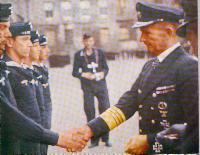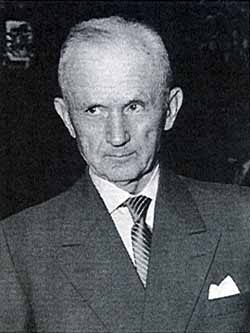
After Hitler’s death on 30 April 1945, Dönitz assumed the reigns of the nation. The decision to surrender unconditionally, however, was not prudent at the outset. German cities taken on the eastern front were massacred in a fashion that would have made Vikings blush, and the Red army didn’t show signs of humanity in the case of further conquests. The Western Allies had decided to partition Germany in a way that Dönitz claimed would ”end our existence as a corporate national entity.” Dönitz’ plan was simply to “to try and save as many lives as I can.”
| Dönitz giving an award to a sailor in better times. |  |
He used the martial tools at his disposal to accomplish this task, with focus on a planned and unified surrender. Had he surrendered all forces at once, some factions would have not recognized him as legitimate and continued to fight to the detriment of the nation and their own lives. Using the fact that the German military had sworn an allegiance to Hitler personally, the successor (Dönitz) demanded the same loyalty, and waited several days to ensure that the loyalty was widely recognized. Overwhelmingly, they heeded Dönitz’ orders. Dönitz had written “I expect discipline and obedience. Chaos and ruin can be prevented only by the swift and unreserved execution of my orders. Anyone who at this juncture fails in his duty and condemns German women and children to slavery and death is a traitor and a coward. The oath of allegiance which you took to the Führer now binds each and every one of you to me, who he himself appointed as his successor.” The surrender took place several days later, and after extremely careful negotiations on Dönitz’ behalf, it took place without major incident.
Dönitz was placed under arrest shortly thereafter, and was tried at Nürnberg for war crimes. He was charged with (1) Conspiring to wage aggressive war; (2) Waging aggressive war; and (3) Violation of the laws of war at sea. The self-described “kangaroo court” acquitted him of the first charge, but convicted him on the other two counts. He served 11 years and 6 months in prison as a result of these charges. The book Doenitz at Nürnberg: A Reappraisal is a collection of the opinions of various admirals and generals, representing almost every nation participating in the war. The overwhelming opinion of these men is that the conviction and punishment of Dönitz is nothing short of abhorrent. One example comes from Vice Admiral Smith, USN: “I believe that Admiral Doenitz was unfairly persecuted. First, it is the duty of an officer of the Armed Services of any country to carry out the policies of his Government....Furthermore, Doenitz was not tried by a military Court, but was sentenced by an International Tribunal under no law that existed during the hostilities of the war period. In my opinion, this was unjust. It was unprecedented.” This statement is typical of the 194 pages of such opinions.
| Dönitz during his time in the Spandau prison. This miscarriage of justice did not go overlooked by the international community. Those with the most ire in the matter, ironically, were his wartime enemies. |  |
 | Karl Dönitz died on Christmas eve of 1980. He and his wife had three children, and were survived only by their daughter, as both sons were killed in action at sea during the war. The funeral of the man even had political undertones: Bundesmarine (Modern-day German Navy) personnel were forbidden from wearing their uniforms, because Dönitz was considered to be too deeply involved in the politics of the Third Reich. |